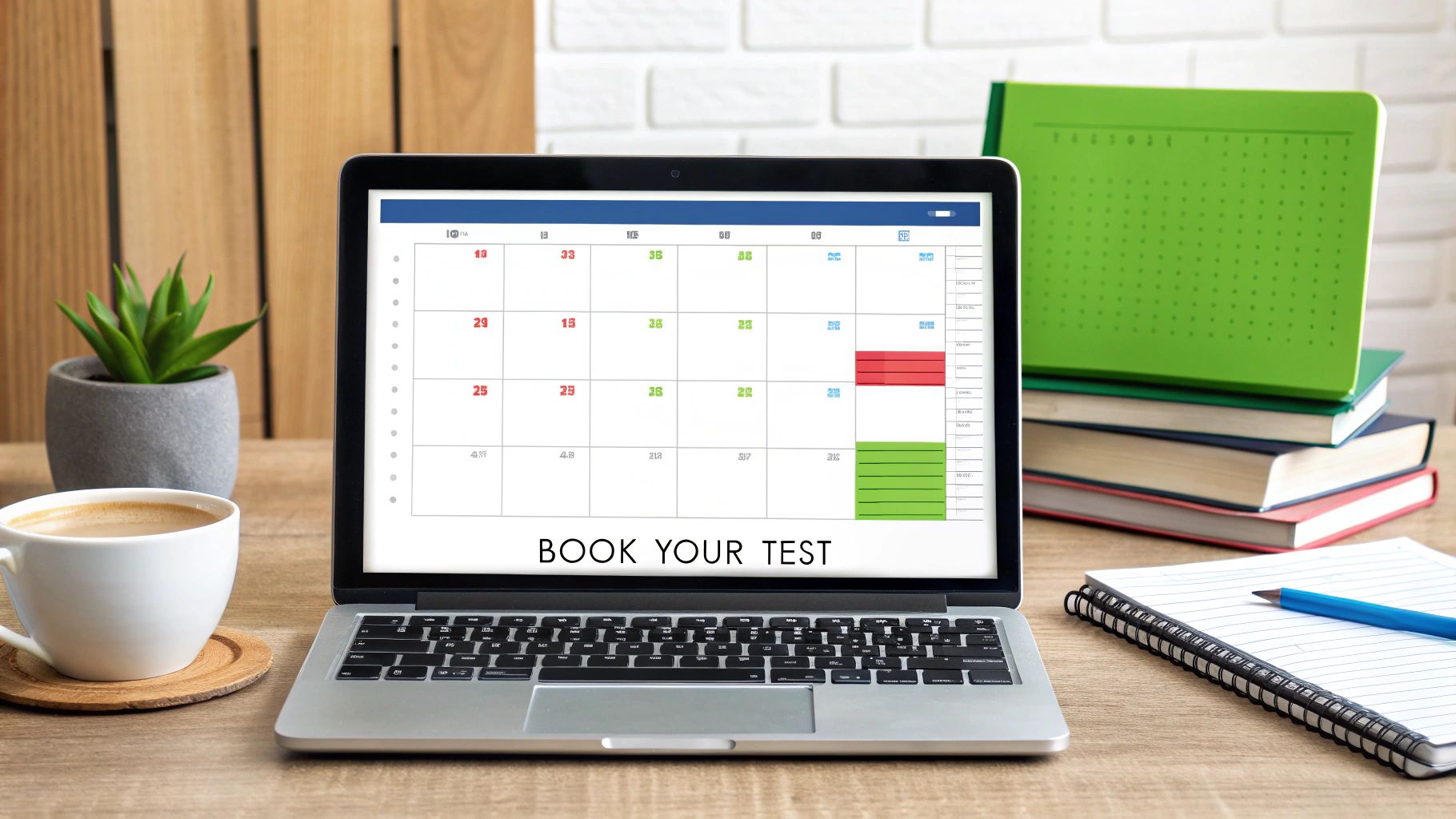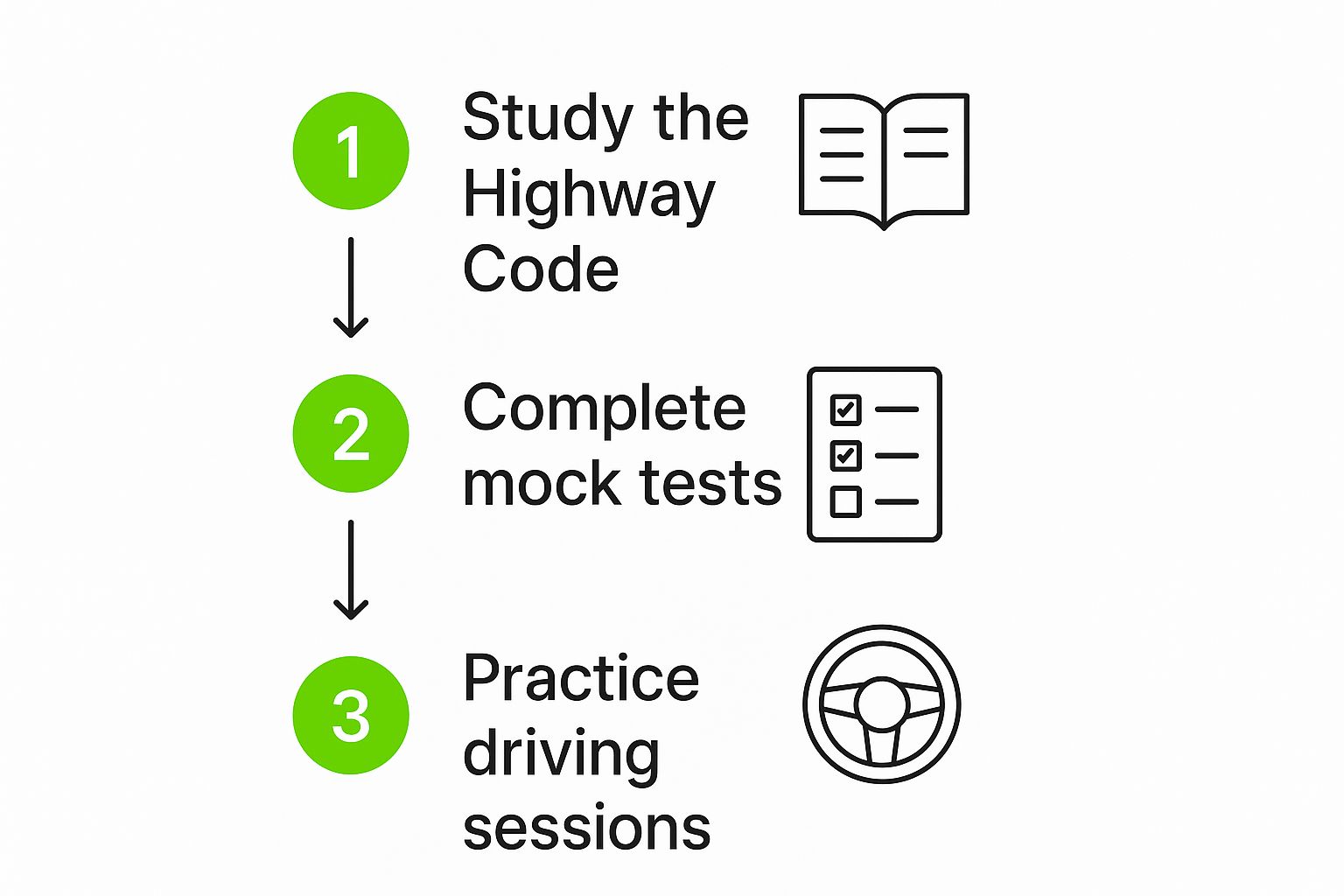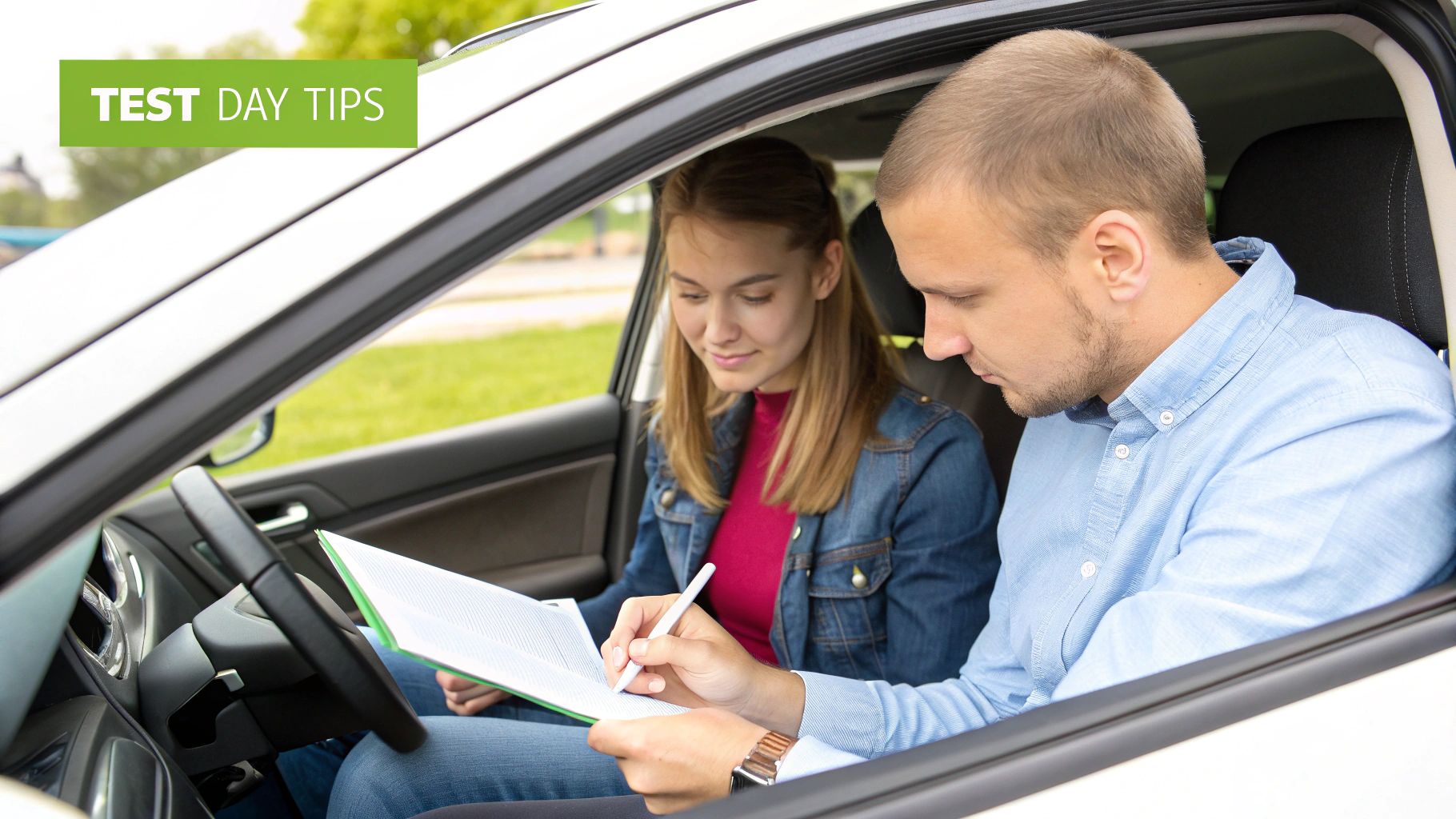If you’ve tried to book a driving test lately, you’ll know exactly how frustrating it is. The whole system is completely gridlocked. A perfect storm of pandemic backlogs and a massive surge in demand has left hundreds of thousands of learners stuck in a queue that seems to stretch on for months.
Getting your head around this chaos is the first step to finding a fast track driving test and finally getting your licence.
Why Is Booking a Driving Test So Hard Right Now?
Let's be blunt: the UK driving test system is buckling under the pressure. What used to be a simple task—booking a test a few weeks out—has become a daily scramble for a handful of slots. This isn’t just a small hiccup; it's a nationwide problem.
The current backlog is a direct hangover from the COVID-19 pandemic. When tests were suspended, a huge pile-up was created. Combine that with a flood of new learners all trying to get on the road at the same time, and you have a system that just can't keep up.
The Sheer Scale of the Waiting List
The numbers really tell the story. Before the pandemic, the waiting list was pretty reasonable. Now, it's a different world. The data shows just how fierce the competition for a test slot has become.
To put it in perspective, the number of scheduled driving tests (known as forward bookings) shot up from just under 200,000 in January 2019 to a massive 580,067 by January 2025. That's a 198% increase in only six years. It’s no wonder it feels impossible.
This isn't just about waiting longer for your freedom. All that extra time means more money on driving lessons to keep your skills sharp, adding a financial headache to the whole frustrating experience.
What This Means for You as a Learner
For you, this means trying to book a test the normal way feels like a lottery. You log on to the DVSA website, full of hope, only to find zero available dates for months on end. Or worse, the site crashes from everyone else doing the same thing.
This is exactly why the idea of a "fast track" test has become so popular. It isn't about cheating the system. It’s about being smart and finding the openings that others miss.
This tough situation has forced learners to get creative. The most effective methods include:
- Snapping up cancellations: Keeping a close eye out for slots that pop up when other people cancel or move their test.
- Using a booking service: Getting a specialist company to do the hard work of finding an earlier test date for you.
- Strategic searching: Knowing exactly when the DVSA releases new batches of appointments on their booking portal.
Understanding just how difficult things are is half the battle. Once you accept the reality of the situation, you can start to plan your attack. If you're eager to get going, you can jump straight into the specifics with our guide on fast track driving test booking.
The rest of this guide will give you the practical tips and know-how you need to beat the queues and pass your test.
Are You Truly Ready for an Earlier Test?

Finding an earlier test date can feel like striking gold, especially with the long waits many learners are facing. But that initial rush of excitement can quickly fade if you're not actually prepared to pass. Nabbing a fast-track driving test is one thing; being ready to make it count is another entirely.
Sure, you’ve got the basics covered—your provisional licence is in hand and your theory test certificate is valid. The real question, though, is whether your driving skills are genuinely up to scratch. This isn't just about what you think; it’s about getting a brutally honest, professional opinion.
The Instructor's Verdict
Your driving instructor is your greatest ally in this. They’ve been through this process with countless learners and know precisely what the examiners are looking for. The big question is: have they given you the green light?
If they seem hesitant, you need to listen. An instructor isn't trying to hold you back or squeeze more money out of you; they’re trying to save you the stress and expense of a failed test. A good instructor can spot weaknesses in your driving that you might be completely oblivious to.
Taking a test before your instructor thinks you’re ready is a massive gamble. You don't just risk losing your test fee (£62 for a weekday slot), but a fail can deliver a serious blow to your confidence, making your next attempt feel ten times harder.
Assessing Your Own Skills and Nerves
Beyond your instructor’s opinion, it’s time for some honest self-reflection. How do you really handle pressure? A short-notice test introduces a unique kind of stress. There's less time to get your head in the game, and the stakes can feel incredibly high.
Ask yourself these questions, and be truthful:
- Can I perform every manoeuvre, like parallel parking or pulling up on the right, perfectly without any prompts?
- Do I feel genuinely confident and safe on tricky roundabouts, busy junctions, or dual carriageways?
- Can I drive for a solid hour without making any serious or dangerous errors?
If you find yourself hesitating on any of these, it’s a clear sign you need more time behind the wheel. The aim isn't just to scrape through by the skin of your teeth; it's to become a safe and confident driver for life. Rushing it rarely works out. Instead, use any extra time to sharpen those skills. That way, when the perfect test slot finally opens up, you'll be ready to turn it into a pass certificate.
Practical Strategies for Finding Test Cancellations

Get used to this screen. This is the official GOV.UK booking portal, and it's where your quest for a fast track driving test will play out. To have any chance of grabbing a last-minute slot, you need to be quick, so keep your provisional licence and theory pass details handy at all times.
The reality is, with the driving test backlog expected to hit over 630,000 by mid-2025, just booking a test and waiting your turn isn't a winning strategy anymore. The competition for every single slot is fierce. While the government is working to increase capacity, proactive learners who know how to hunt for cancellations will always get to the front of the queue. You can read more about the official government response and the full figures on The Independent.
Mastering the Manual Refresh
The old-fashioned way of finding a cancellation is still one of the most effective: manually searching the DVSA booking system yourself. It doesn't cost a penny, but it does require time and a good deal of patience.
Cancellations pop up around the clock as other learners change their plans. From my experience, though, certain times are definite hotspots. A lot of people sort out their diaries over the weekend, leading to a flurry of cancellations first thing on a Monday morning. These early weekday hours are prime hunting time.
Top Tip: My best advice is to keep the DVSA booking page open in a browser tab on your phone or computer. Whenever you have a spare moment—on your lunch break, on the bus, while the kettle boils—give it a refresh. You never know when the perfect slot at your local test centre will appear. Consistency is everything.
Using Third-Party Cancellation Finders
Let's be honest, hitting refresh all day isn't for everyone. If that sounds like a chore, you might want to look into a third-party cancellation service. These apps and websites do the hard work for you, constantly scanning the DVSA system and pinging you the second a suitable test date opens up.
Of course, they aren't free. You'll typically pay a one-off fee, but for many learners, it's a small price to pay to avoid hours of manual searching. They’re an incredibly popular choice if you need a fast track driving test but just don't have the time to do the legwork.
If you go down this route, here's what to look for:
- Cost: Fees usually range from £15 to £30. Shop around and see what different services offer for the price.
- Features: Some apps are fully automated and will even book a slot on your behalf (with your permission, of course). Others simply send you a notification, leaving you to log in and book it. Think about how hands-on you want to be.
- Reviews: Always check recent, independent reviews on sites like Trustpilot. You want a reliable service with a track record of helping real learners pass.
The Game Plan When a Slot Appears
This is crucial: whether you find a slot yourself or get an alert from an app, you have to be ready to act instantly. The best cancellations are often gone in less than a minute. There’s no time to check your calendar or ring your instructor.
Before you even begin your search, have a serious chat with your driving instructor. First, make sure they agree you're 100% ready for the test. Second, get a clear idea of their availability. Knowing the days and times they're generally free means you can book a new date with confidence the moment it appears.
Being prepared is what separates the people who snag those early tests from those who watch them slip away.
Your Short-Notice Test Preparation Plan
Getting a test date is a massive win, but don't celebrate just yet. Landing a fast track driving test means your prep time has been cut down, sometimes to just a couple of weeks. This is where you and your instructor need a solid, focused game plan to turn that last-minute slot into a first-time pass.
You're not trying to learn how to drive all over again. The key is surgical precision—finding your weak spots and practising them until they're second nature. Think of your instructor as your co-pilot for this mission. As soon as you've booked that test, get on the phone with them and cram in as many lessons as you can, essentially creating your own mini-intensive course.
Creating Your Mini-Intensive Course
These final lessons aren't for casually driving around. Your instructor should be structuring every minute with your test date looming. The goal shifts from learning new things to polishing what you already know, specifically under test conditions.
This is what that targeted practice should look like:
- Mastering the Manoeuvres: Spend whole lessons on the manoeuvres that give you nightmares. If parallel parking makes your palms sweat, dedicate an entire hour to it. Repetition builds muscle memory.
- Driving the Test Routes: Your instructor knows the local test centre's favourite routes. Driving these roads again and again means no nasty surprises on the day. You’ll get comfortable with that tricky roundabout or that one awkward, unsighted junction.
- Nailing the Independent Drive: This section is a big chunk of the modern test. You need to be confident following directions from a sat nav or road signs without getting flustered. Practice is the only way to get there.
Here's a tip from experience: stop treating these final lessons like regular lessons. Ask your instructor to act like a real examiner. Get them to be ruthless, pointing out every single minor fault. It's far better to fix them now than to have them clocked on your test sheet.
This simple flow is exactly what your final prep should look like.

It’s a cycle: revise the theory, test yourself with mock questions, and then put it all into practice behind the wheel. Simple, but incredibly effective.
The Final Countdown Checklist
To make sure you're both mentally and practically ready for the big day, a structured approach in the final week can be a game-changer. It’s all about staying calm and organised.
This table breaks down how you might want to structure that final week.
Short-Notice Test Preparation Checklist
| Timeframe | Focus Area | Key Actions |
|---|---|---|
| 1-2 Weeks Before | Skill Assessment & Intensive Practice | Book a block of lessons. Identify weak areas (manoeuvres, specific junctions) with your instructor and drill them repeatedly. |
| 3-4 Days Before | Mock Test & Mental Prep | Conduct a full 40-minute mock test under exam conditions. Start drilling the 'Show Me, Tell Me' questions daily. |
| The Day Before | Final Review & Organisation | Light revision only—no heavy driving. Gather all your documents (licence, theory certificate). Get an early night. |
| The Day Of | Calm & Confidence | Have a good breakfast. Arrive at the test centre with plenty of time to spare. Trust in your preparation. |
Following a plan like this helps remove the element of panic, letting you focus purely on your driving.
Crucial Final Steps
Here are a few non-negotiable tasks for those last few days.
Do a Full-Scale Mock Test
Your very last lesson should be a proper mock test. We're talking a full 40-minute drive, one manoeuvre, a possible emergency stop, and the independent driving section. It’s the ultimate dress rehearsal for your skills and your nerves. For more tips, check out our guide on how to pass your driving test quickly.
Drill the ‘Show Me, Tell Me’ Questions
These are two easy marks you simply can't afford to throw away. There are 14 'Tell Me' questions (asked before you start driving) and 7 'Show Me' questions (asked while you're driving). Get a family member to quiz you or use flashcards—whatever it takes to answer them without a second thought.
Get Your Paperwork Ready
The night before your test, get everything together in one place. This avoids that heart-stopping moment of panic on the morning of your test. You will need:
- Your UK provisional driving licence.
- Your theory test pass certificate. You might not be asked for it, but it’s always better to have it just in case.
- Your glasses or contact lenses if you need them for driving.
With all this sorted, you can walk into the test centre with only one thing on your mind: driving your best.
How Your Test Centre Location Impacts Your Chances

When you're frantically trying to find any test slot you can get, it's all too easy to ignore one of the most critical factors in your success: the test centre itself. It’s a detail many learners gloss over, but where you take your test can genuinely swing the odds in your favour.
So, here's the big question: should you book a fast track driving test an hour away just because it has a better pass rate? It’s a classic dilemma. The official data clearly shows that pass rates are not the same everywhere; they can vary wildly from one town to the next.
This has nothing to do with some centres having "easier" examiners. The real difference comes down to the local driving environment. Things like the complexity of the roads, how much traffic you’ll encounter, and the specific types of roundabouts and junctions you'll have to navigate all feed into these statistics.
Urban vs. Rural: The Great Divide
A huge part of this is the classic split between city and countryside. Test centres in quiet, rural spots with simpler road layouts and lighter traffic often have much higher pass rates. On the other hand, centres in busy urban areas, with their multi-lane roundabouts, constant congestion, and confusing one-way systems, tend to have lower pass rates.
It just makes sense. Driving through central London during the school run is a whole different ball game compared to navigating a sleepy Scottish village. Your test route is a direct sample of the area around the centre, so choosing wisely can really play to your strengths.
The national average pass rate in early 2025 hovered around 48.5%, but that single number hides some massive local variations. For example, the Sidcup test centre on the outskirts of London has a pass rate of 58.1%. Meanwhile, some centres in the West Midlands, like Featherstone, are known for being particularly tough. You can explore more about how test centres compare on Cuvva.com.
Making a Strategic Choice
So, what's the right move for you? Travelling for a test isn't a decision to make on a whim. Before you jump on a slot miles from home, you need to properly weigh the pros and cons.
- Familiarity is a double-edged sword. Driving locally means you and your instructor know the roads, junctions, and tricky spots inside out. But that comfort can sometimes breed complacency. You might actually be more focused and alert in an unfamiliar area.
- A higher pass rate is tempting. Knowing a centre has a statistically better success rate can be a great psychological boost, and it often means the routes are less complex.
- Don't forget the logistics. You have to account for the time and money it will take to travel for lessons in the new area. You can't just rock up on test day and hope for the best; you'll need a good few hours of practice on the local roads to have any real chance of passing.
Ultimately, there’s no one-size-fits-all answer. If you feel you're a solid driver but happen to live in an area with notoriously difficult test routes, travelling could be a very smart move. But if you’re a more nervous driver, sticking to the familiar roads you’ve spent months practising on is probably the safer bet.
Have a proper chat with your instructor—their experience and insight here are worth their weight in gold.
Common Questions About Fast Track Driving Tests
Even with the best-laid plans, trying to find a fast-track driving test can feel a bit confusing. It’s a stressful time, and hitting a roadblock is completely normal. Let’s clear up some of the most common questions and sticking points learners run into.
Think of this as your go-to guide for those "what if" moments. We’ll untangle the tricky bits and give you some real, practical advice so you can handle the booking system like a pro.
Can I Change My Test Date to an Earlier One?
Yes, you absolutely can. In fact, this is the whole point of the fast-track or cancellation-finding process. As soon as you have a test booked—even if it's months down the line—you unlock the ability to use the DVSA's online service to look for earlier slots. When someone else cancels, their appointment pops up, and it's yours for the taking.
Just remember, you have to have a test booked in the system first. You can't just browse for last-minute tests without having secured your place in the queue.
What If My Instructor Isn't Available for the New Date?
This is a massive risk and something you absolutely have to plan for. There's no point grabbing a dream test slot for next Tuesday if your instructor is already booked solid. Before you even think about searching, sit down and have a proper chat with them. Find out their windows of availability.
Crucial Insight: Never, ever confirm a new test date without checking with your instructor first. The best slots vanish in a heartbeat. Have that availability conversation before you start looking. Otherwise, you'll either lose the slot while you try to contact them or have to cancel it yourself.
Is It Better to Use a Cancellation App or Do It Myself?
This really comes down to how much time and patience you have. Staring at the DVSA website and hitting refresh is free, but it's a real test of dedication. If you’ve got the time to spare and the willpower of a saint, you can definitely find a slot this way.
On the other hand, cancellation apps do all the tedious work for you for a small fee, usually around £18-£25. They check constantly and ping you when a match is found. If you're trying to fit this around work, college, or family life, that fee can be a small price to pay for your sanity and a much faster test date.
For those who want a fully structured approach to getting road-ready quickly, you might find our guide to intensive driving courses helpful. These courses often bundle everything together, including finding you that all-important test slot.
How Often Are New Test Dates Released?
The DVSA releases a fresh batch of standard driving test appointments every Monday at 6 am. This is when you’ll see a large number of new slots appear, but they are typically for dates several months away.
Cancellations are a different beast entirely. They can pop up at any time of day or night, seven days a week. There’s no pattern, which is why persistent checking (either by you or an app) is the only strategy that works. You have to be ready to pounce the moment a slot appears.
At Fast Pass Driving Courses, we take all the stress and hassle out of finding that early test date. Our intensive and semi-intensive courses are built to get you skilled and confident behind the wheel, and we handle the fast-track test booking for you. Visit us at Fast Pass Driving Courses to find the right course to get you on the road sooner.

